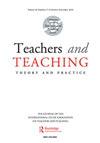助教自我效能感、情绪幸福感与工作满意度的关系研究
IF 1.9
2区 教育学
Q2 EDUCATION & EDUCATIONAL RESEARCH
引用次数: 0
摘要
虽然助教(助教)经历了各种各样的就业挑战,但很少有研究调查影响他们幸福感的因素。本研究基于教师情绪与幸福感研究的扩展控制-价值模型,考察了形成性反馈实践(简称TFBCV)背景下小学教师的控制-价值变量与教师情绪幸福感及其他幸福感指标之间的关系。来自本港184所小学的305名助教参与了这项调查研究。在香港,每所主流学校通常至少有一名助教协助有特殊教育需要的学生。这个样本代表全港39%的小学,因为每所学校有一名助教参加这项研究,而这些参与研究的学校。结果支持了我们的假设,即TFBCV对组合积极情绪和两种离散积极情绪(喜悦和爱)都有显著的直接影响。TFBCV通过积极情绪对工作满意度也有显著的间接影响。有趣的是,工作压力与TFBCV和积极情绪几乎不相关。我们讨论了扩展教师幸福感研究的意义,以包括当前文献中“缺失”但重要的助教部分。本文章由计算机程序翻译,如有差异,请以英文原文为准。
Examining the relationships among teaching assistants’ self-efficacy, emotional well-being and job satisfaction
While teaching assistants (TAs) have experienced various employment challenges, little research has been done to examine factors affecting their well-being. Based on an extended Control-Value model in studying teachers’ emotions and well-being, the present study examined the relationship between primary school TAs’ Control-Value variables in the context of formative feedback practice (abbreviated as TFBCV), their emotional well-being, and other well-being indicators. 305 TAs from 184 primary schools in Hong Kong participated in this survey study. Usually, there is at least one TA to support students with special educational needs in each mainstream school in Hong Kong. This sample represents 39% of primary schools in Hong Kong given that each school has one TA to join this study and these participating schools. The results supported our hypotheses that TFBCV has significant direct effects on both a combined positive emotion and the two discrete positive emotions (Joy and Love). TFBCV also has a significant indirect effect on job satisfaction via positive emotions. Interestingly, job stress was nearly uncorrelated with TFBCV and positive emotions. We discuss implications for extending teacher well-being research to include the ‘missing’ but essential piece of TAs in the current literature.
求助全文
通过发布文献求助,成功后即可免费获取论文全文。
去求助
来源期刊

Teachers and Teaching
EDUCATION & EDUCATIONAL RESEARCH-
CiteScore
4.20
自引率
7.40%
发文量
71
期刊介绍:
Teachers and Teaching: theory and practice provides an international focal point for the publication of research on teachers and teaching, in particular on teacher thinking. It offers a means of communication and dissemination of completed research and research in progress, whilst also providing a forum for debate between researchers. This unique journal draws together qualitative and quantitative research from different countries and cultures which focus on the social, political and historical contexts of teaching as work. It includes theoretical reflections on the connections between theory and practice in teachers" work and other research of professional interest.
 求助内容:
求助内容: 应助结果提醒方式:
应助结果提醒方式:


